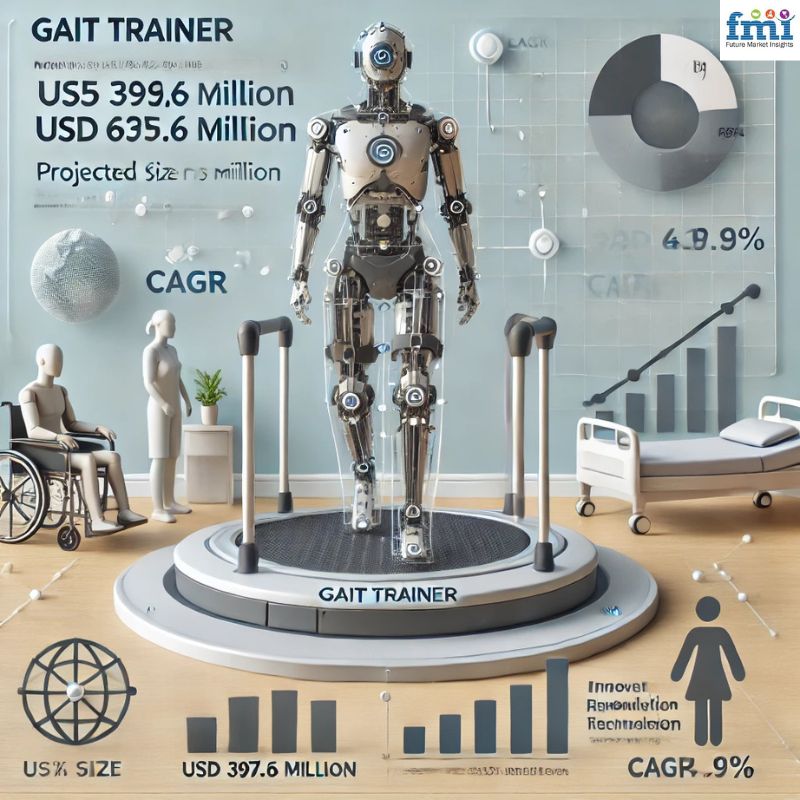
Gait Trainer Market Set to Grow from USD 395.6 Million in 2025 to USD 637.8 Million by 2035 at a 4.9% of CAGR

Gait Trainer Market
The Gait Trainer Market is forecasted to expand at a 4.9% CAGR from 2025 to 2035, fueled by rising demand for robotic, AI-driven rehabilitation technologies.
NEWARK, DE, UNITED STATES, February 4, 2025 /EINPresswire.com/ -- The global gait trainer market is set for substantial expansion, projected to grow from USD 395.6 million in 2025 to USD 637.8 million by 2035, reflecting a compound annual growth rate (CAGR) of 4.9%. This growth is driven by the increasing prevalence of neurological and orthopedic disorders, alongside rapid advancements in rehabilitation technology. As aging populations and post-stroke patients seek effective mobility solutions, the demand for gait training devices continues to rise, positioning the industry for significant progress.
With over 15 million people suffering strokes annually, the need for gait rehabilitation has never been more pressing. Technological innovations, such as robotic gait trainers and AI-integrated wearable devices, are revolutionizing rehabilitation by enhancing precision and patient outcomes. These advancements not only improve mobility for individuals recovering from injuries and neurological conditions but also contribute to the overall efficiency of physical therapy programs.
𝐑𝐞𝐪𝐮𝐞𝐬𝐭 𝐚 𝐒𝐚𝐦𝐩𝐥𝐞 𝐂𝐨𝐩𝐲 𝐍𝐨𝐰: https://www.futuremarketinsights.com/report-sample#5245502d47422d32323133
Regionally, North America and Europe lead the market due to their well-established healthcare infrastructure and high adoption rates of medical technology. However, Asia-Pacific is expected to witness the fastest growth, driven by increasing investments in healthcare and a rising awareness of rehabilitation solutions. Government initiatives aimed at strengthening healthcare infrastructure in emerging economies further support the widespread adoption of gait trainers, ensuring accessibility for a broader patient base.
𝐊𝐞𝐲 𝐓𝐫𝐞𝐧𝐝𝐬 𝐚𝐧𝐝 𝐈𝐧𝐬𝐢𝐠𝐡𝐭𝐬
Rising Demand for Rehabilitation Technologies:
There has been a notable increase in the demand for complex rehabilitation technologies aimed at enhancing locomotion and facilitating rehabilitation processes. This trend is driving the growth of the gait trainer market.
Diverse Product Offerings:
The market comprises various product lines, including walkers, exoskeletons, and treadmill systems.
Walker Models: These are popular due to their simplicity and effectiveness, particularly for individuals with limited or moderate walking capabilities.
Exoskeletons: These advanced devices are gaining traction for patients with severe impairments, such as paralysis, offering robotic assistance to restore mobility.
Treadmill Systems: Integrated with robotic and AI technology, these systems are increasingly used in rehabilitation settings to enhance recovery outcomes.
Technological Advancements:
Innovations in gait training technologies, including the integration of digital health technologies like wearable sensors and data analytics, are improving the effectiveness of gait trainers and increasing their adoption in healthcare facilities.
Growing Incidence of Mobility Impairments:
The rising prevalence of conditions that affect mobility, such as cerebral palsy, Parkinson's disease, and spinal injuries, is contributing to the increased demand for gait trainers.
Focus on Pediatric and Geriatric Populations:
There is a growing emphasis on developing gait trainers tailored for both pediatric and geriatric populations, as these groups often require specialized support for mobility challenges.
Market Opportunities in Developing Regions:
Emerging markets present significant growth opportunities due to increasing healthcare expenditures and rising awareness about rehabilitation technologies.
𝐀 𝐅𝐮𝐥𝐥 𝐑𝐞𝐩𝐨𝐫𝐭 𝐎𝐯𝐞𝐫𝐯𝐢𝐞𝐰 - https://www.futuremarketinsights.com/reports/gait-trainer-market
How do exoskeletons compare to traditional gait trainers in terms of effectiveness?
Exoskeletons and traditional gait trainers serve distinct purposes in rehabilitation, particularly for individuals with mobility impairments. Here’s a
comparison of their effectiveness based on current research findings:
Effectiveness of Exoskeletons vs. Traditional Gait Trainers
Gait Speed Improvement:
Studies indicate that wearable exoskeletons significantly improve gait speed in patients, especially in post-stroke rehabilitation. For instance, a review found that gait training using exoskeletons resulted in a substantial increase in gait speed compared to conventional gait training methods, with standardized mean differences indicating significant benefits for those using exoskeletons.
Metabolic Efficiency:
Research has shown that robotic exoskeletons can enhance metabolic efficiency during walking. For example, a study involving an Active Pelvis Orthosis (APO) demonstrated a reduction in oxygen consumption rates while using the device, indicating that exoskeleton-assisted walking can be less taxing metabolically compared to traditional walking without assistance 1. This suggests that exoskeletons not only aid mobility but also improve the energy efficiency of walking.
Functional Mobility:
Exoskeletons have been found to assist patients with severe impairments, such as those resulting from paralysis, by providing robotic assistance that enables them to regain some level of mobility. This contrasts with traditional gait trainers, which may not offer the same level of support for individuals with more significant mobility challenges.
Long-Term Benefits:
Some studies suggest that improvements in gait efficiency and speed achieved through exoskeleton training can persist beyond the training period, indicating potential long-term benefits from this technology. Traditional gait training may not always provide similar lasting effects without continuous practice or intervention.
User Experience and Adaptability:
Exoskeletons often incorporate advanced technologies such as AI and robotics, which can adapt to the user’s movements and provide tailored assistance. This adaptability can enhance the rehabilitation experience compared to more static traditional gait trainers, which may not adjust as effectively to individual user needs.
Clinical Justification and Cost:
While exoskeletons show promising results, earlier studies indicated that they initially failed to demonstrate clinical improvements justifying their higher costs compared to traditional methods.
𝐓𝐡𝐞𝐫𝐚𝐩𝐞𝐮𝐭𝐢𝐜 𝐃𝐞𝐯𝐢𝐜𝐞 𝐈𝐧𝐝𝐮𝐬𝐭𝐫𝐲 𝐀𝐧𝐚𝐥𝐲𝐬𝐢𝐬: 𝐊𝐞𝐲 𝐓𝐫𝐞𝐧𝐝𝐬, 𝐌𝐚𝐫𝐤𝐞𝐭 𝐅𝐨𝐫𝐞𝐜𝐚𝐬𝐭𝐬 & 𝐂𝐨𝐫𝐩𝐨𝐫𝐚𝐭𝐞 𝐈𝐧𝐬𝐢𝐠𝐡𝐭𝐬 𝐀𝐜𝐫𝐨𝐬𝐬 𝟏𝟓+ 𝐂𝐨𝐮𝐧𝐭𝐫𝐢𝐞𝐬 - https://www.futuremarketinsights.com/industry-analysis/therapeutic-device
𝐊𝐞𝐲 𝐓𝐚𝐤𝐞𝐚𝐰𝐚𝐲𝐬 𝐟𝐫𝐨𝐦 𝐌𝐚𝐫𝐤𝐞𝐭 𝐒𝐭𝐮𝐝𝐲
• Gait Trainer Market size in 2025: USD 395.6 million
• Projected market size by 2035: USD 637.8 million
• CAGR from 2025 to 2035: 4.9%
• The robotic gait trainer segment is expected to grow at the fastest pace due to technological advancements.
• North America held the largest market share in 2025, followed by Europe.
• Asia-Pacific to witness the highest CAGR due to healthcare infrastructure development.
• The growing prevalence of post-stroke and spinal cord injury patients is a key market driver.
"The gait trainer market is undergoing a transformation with innovations in rehabilitation technology. The rising burden of neurological disorders and an aging population globally have positioned gait trainers as an essential tool in modern physiotherapy. As governments and private players invest in healthcare development, especially in emerging markets, the industry is set for robust growth over the next decade." Says Sabyasachi Ghosh (Associate Vice President at Future Market Insights, Inc.)
𝐂𝐨𝐦𝐩𝐨𝐧𝐞𝐧𝐭 𝐈𝐧𝐬𝐢𝐠𝐡𝐭𝐬
The gait trainer market is segmented into:
Robotic Gait Trainers: Leading the market with advanced functionalities like real-time feedback and motion analysis.
Manual Gait Trainers: Preferred for cost-effectiveness and simplicity, especially in low-resource settings.
Wearable Gait Trainers: A growing trend, offering portability and ease of use in home care settings.
𝐊𝐞𝐲 𝐏𝐥𝐚𝐲𝐞𝐫𝐬 𝐨𝐟 𝐆𝐚𝐢𝐭 𝐓𝐫𝐚𝐢𝐧𝐞𝐫 𝐈𝐧𝐝𝐮𝐬𝐭𝐫𝐲
• Meyland Smith A/S
• Biodex Medical Systems
• Medica Medizintechnik GmbH
• ReWalk Robotics
• Alter G Inc.
• Rex Bionics Ltd.
• Ekso Bionics
• Hocoma AG
• Otto Bock Inc.
• Rifton Equipment
• Medical Depot Inc. (Drive Medical)
𝐂𝐥𝐢𝐜𝐤 𝐇𝐞𝐫𝐞 𝐭𝐨 𝐀𝐜𝐜𝐞𝐬𝐬 𝐌𝐨𝐫𝐞 𝐈𝐧𝐬𝐢𝐠𝐡𝐭𝐬 𝐨𝐧 𝐭𝐡𝐢𝐬 𝐌𝐚𝐫𝐤𝐞𝐭, 𝐆𝐞𝐭 𝐀 𝐒𝐚𝐦𝐩𝐥𝐞 𝐑𝐞𝐩𝐨𝐫𝐭: https://www.futuremarketinsights.com/report-sample#5245502d47422d32323133
𝐊𝐞𝐲 𝐒𝐞𝐠𝐦𝐞𝐧𝐭𝐬 𝐨𝐟 𝐆𝐚𝐢𝐭 𝐓𝐫𝐚𝐢𝐧𝐞𝐫 𝐈𝐧𝐝𝐮𝐬𝐭𝐫𝐲
By Product:
In terms of product, the industry is divided into gait trainer walkers, exoskeletons and treadmill systems.
By End User:
In terms of end user, the industry is segregated into hospitals, rehabilitation centers and home care settings.
By Region:
Key countries of North America, Latin America, East Asia, South Asia & Pacific, Western Europe, Eastern Europe, and Middle East and Africa (MEA) have been covered in the report.
𝐄𝐱𝐩𝐥𝐨𝐫𝐞 𝐅𝐌𝐈'𝐬 𝐄𝐱𝐭𝐞𝐧𝐬𝐢𝐯𝐞 𝐂𝐨𝐯𝐞𝐫𝐚𝐠𝐞 𝐢𝐧 𝐭𝐡𝐞 𝐇𝐞𝐚𝐥𝐭𝐡𝐜𝐚𝐫𝐞 𝐃𝐨𝐦𝐚𝐢𝐧:
Absorbable Tissue Spacer Industry Outlook from 2025 to 2035 - https://www.futuremarketinsights.com/reports/absorbable-tissue-spacer-market
Electrosurgery Generators Industry Outlook from 2025 to 2035 - https://www.futuremarketinsights.com/reports/electrosurgery-generators-market
Foley Catheter Industry Analysis from 2025 to 2035 - https://www.futuremarketinsights.com/reports/foley-catheter-market
Cold Laser Therapy Industry Outlook from 2025 to 2035 - https://www.futuremarketinsights.com/reports/cold-laser-therapy-market
Localized Temperature Therapy Products Industry Analysis from 2025 to 2035 -https://www.futuremarketinsights.com/reports/localized-temperature-therapy-products-market
About Future Market Insights (FMI)
Future Market Insights (FMI) is a leading provider of market intelligence and consulting services, serving clients in over 150 countries. FMI is headquartered in Dubai and has delivery centres in the United Kingdom, the United States, and India. FMI's latest market research reports and industry analysis helps businesses navigate challenges and make critical decisions with confidence and clarity amidst breakneck competition. Our customized and syndicated market research reports deliver actionable insights that drive sustainable growth. A team of expert-led analysts at FMI continuously tracks emerging trends and events in a broad range of industries to ensure that our clients prepare for the evolving needs of their consumers.
Join us as we commemorate 10 years of delivering trusted market insights. Reflecting on a decade of achievements, we continue to lead with integrity, innovation, and expertise.
Contact Us
Future Market Insights Inc.
Christiana Corporate, 200 Continental Drive,
Suite 401, Newark, Delaware - 19713, USA
T: +1-347-918-3531
For Sales Enquiries: sales@futuremarketinsights.com
Website: https://www.futuremarketinsights.com
LinkedIn| Twitter| Blogs | YouTube
Ankush Nikam
Future Market Insights, Inc.
+ +91 90966 84197
email us here
Visit us on social media:
Facebook
X
LinkedIn
YouTube
Other
Distribution channels: Healthcare & Pharmaceuticals Industry
Legal Disclaimer:
EIN Presswire provides this news content "as is" without warranty of any kind. We do not accept any responsibility or liability for the accuracy, content, images, videos, licenses, completeness, legality, or reliability of the information contained in this article. If you have any complaints or copyright issues related to this article, kindly contact the author above.
Submit your press release
